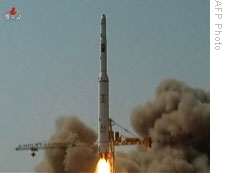 |
| US President Barack Obama and Russian President Dmitri Medvedev during their meeting ahead of G20 summit in London, 1 Apr 2009 |
U.S. President Barack Obama returned home earlier this week after his first – and what many analysts describe as – largely successful, international trip as head of state. One aspect of his eight-day trip that captured world attention was his meeting in London with Russian President Dmitri Medvedev (April 1) in which the two agreed on the need for a new strategic arms reduction treaty this year.
A Russian Perspective
It is generally held that U.S.-Russian relations at the end of the George W. Bush administration had reached their lowest point since the end of the Cold War in 1991. Russian journalist Masha Lipman of the Carnegie Moscow Center describes Russian state media coverage of last week’s meeting between the American and Russian presidents as benevolent when compared with attitudes just a few months earlier. Speaking with host Judith Latham of VOA’s International Press Club, Lipman calls it a positive change in tone. However, she warns it remains to be seen if that tone will be translated into substantial improvement in relations.
The issue of American plans to build a missile shield in the Czech Republic and Poland remains a major bone of contention, says Lipman. “Russians have no desire to believe the plan to install elements of the American anti-missile defense is aimed against Iran.” Lipman says Moscow does not trust Washington on this point. “It is unlikely that Russia would get any guarantees that American anti-missile defense elements would not be installed in Central Europe,” she adds. Furthermore, she says that would create an obstacle to any negotiations with Iran over its nuclear program.Lipman says what Russia wants are “guarantees against so-called red lines,” such as the anti-missile defense system in Central Europe and the enlargement of NATO to include Georgia and Ukraine. Lipman reminds VOA listeners that President Obama has ruled out the recognition of “special zones of interest,” as well as American recognition of the independence of South Ossetia and Abkhazia from Georgia.
 |
| North Korean Television shows a three-stage white rocket, bearing the word "Chosun" (Korea), soaring away from the launch site into the sky on April 5, 2009 from an undisclosed location in North Korea. |
Lipman points to Moscow’s position in the U.N. Security Council regarding North Korea’s recent rocket launch as an illustration of the continuing gulf between Russia and the Western powers. “It demonstrates that the actual relationship between Russia and the United States has not changed and that the same issues they could not agree on [before], they still cannot agree on.” The Security Council is the venue where they disagree, says Lipman. “Russia’s veto power there is practically the only thing Russia has left” of its former role as a superpower.
An American Perspective
American analyst Paul Goble, author of many books and articles on Eurasia, says the issue of nuclear nonproliferation is the only area where Washington and the Kremlin share common goals. “For the past 40 years, Americans have defined their relationship with Moscow in terms of arms control and restricting nuclear weapons.” Consequently, he says, that’s where a deal is most likely to be reached. Goble says it is “almost certain that Iran will acquire a nuclear weapons capacity before the end of this year.” And when that happens, Goble says Russia might become more interested in the protection that a missile shield might offer. On virtually every other issue – Georgia, North Korea, and monetary policy – Goble says the United States and the Russian Federation remain at odds.
A German Perspective
 |
| German Chancellor Angela Merkel and US President Obama at a joint news conference in Baden-Baden, Germany, 03 Apr 2009 |
Journalist Christian Wernicke of Munich’s daily newspaper Sueddeutsche Zeitung describes Germany’s reaction to the recent meeting between the U.S. and Russian presidents as “quite positive,” especially on the question of nuclear weapons.Wernicke says high-ranking German diplomats began approaching President Obama’s advisers even before he was elected, urging them to “make bold moves on the nuclear issue.” Of special concern was the failure of the United States to ratify the Comprehensive Test Ban Treaty, which is to expire by the end of 2009.
The Political Challenge
The treaty was rejected by a Republican-controlled Senate in 1999. But if the U.S. Senate were to ratify it now, supporters say U.S. leadership could inspire similar action by Iran, North Korea, China, and five other nations that are currently blocking its implementation. Moves toward ratification are now underway in the U.S. Senate, and if successful, they might prove to be the key step toward nuclear disarmament and non-proliferation.